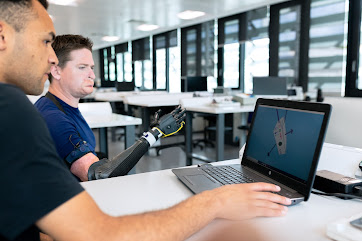AI In The Field Of Academia
AI is undoubtedly the talk of the town nowadays, and for good reason too. Its potential to revolutionize the way we do things is immense, and its impact on the academic field is no exception. As AI technology becomes more accessible to students, it is sure to change the way we approach education and research. In this post, we'll take a closer look at how AI could affect the academic field.
One of the most significant benefits of AI in the academic field is its ability to automate many repetitive tasks. This automation will free up a lot of time and resources for students and researchers, allowing them to focus on more complex and creative aspects of their work. For example, AI can be used to analyze data, generate reports, and even write research papers. This will not only make research more efficient, but it will also improve the quality of research as AI can provide insights that humans may not have been able to identify.
AI can also be used to enhance the learning experience for students. With the help of AI-powered tools, students can receive personalized learning experiences tailored to their specific needs and abilities. This means that students will be able to learn at their own pace and receive targeted support to address any learning gaps. In addition, AI-powered virtual tutors and assistants can be available 24/7, providing support and answering questions that students may have.
AI can also revolutionize the way we approach research. With the vast amount of data available, it can be challenging to identify patterns and insights that could inform new research. AI can help us overcome this challenge by analyzing large data sets and identifying key patterns and insights that may not have been visible otherwise. This could lead to more innovative and groundbreaking research, as researchers can make connections that were previously undiscovered.
While there are numerous benefits to using AI in the academic field, it's important to be aware of the potential dangers that come with relying too heavily on AI to do the work for us. One of the main concerns is that students may become overly dependent on AI-powered tools to complete their work, leading to a lack of critical thinking and creativity. This could lead to a generation of students who are less capable of problem-solving and innovation, as they rely too heavily on AI to do the thinking for them.
Additionally, there is a risk that AI-powered tools may not always be accurate or reliable. While AI is becoming increasingly sophisticated, it's still not perfect, and there is always a risk of errors or inaccuracies in data analysis. Students who rely solely on AI-powered tools may not be able to identify these errors and may end up producing work that is flawed or inaccurate. This could have serious consequences, especially in fields where accuracy and precision are critical, such as science and engineering.
Another example, some people worry that AI could replace human jobs in academia. While it's true that AI can automate many repetitive tasks, it's important to remember that it's not a substitute for human creativity and critical thinking. Instead, AI can help us be more efficient and effective in our work, freeing up time for more complex and creative aspects of our research and teaching.
Overall, while AI can be a valuable tool in the academic field, it's important for students to use it responsibly and with caution. AI should be seen as a supplement to human intelligence, not a replacement for it. Students should continue to develop their critical thinking and problem-solving skills, while using AI to enhance their work and improve their efficiency. By doing so, we can ensure that AI remains a valuable tool in the academic field, rather than a hindrance to innovation and creativity.
In conclusion, AI has the potential to transform the academic field in numerous ways. It can automate repetitive tasks, enhance the learning experience for students, and revolutionize the way we approach research. While there are concerns about how AI could affect the job market in academia, it's important to remember that AI is not a substitute for human creativity and critical thinking. Instead, it can help us be more efficient and effective in our work, allowing us to focus on the more complex and creative aspects of our research and teaching.
My name is Spec and I own a small media company called OnTheSpectrum Media. I'm autistic and I create content along with a few others who are also neurodivergent. If you would like to see some of our human-generated content feel free to have a look at the links below.




Comments
Post a Comment